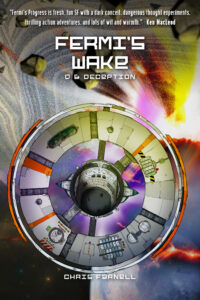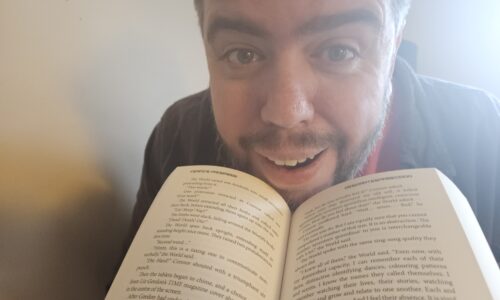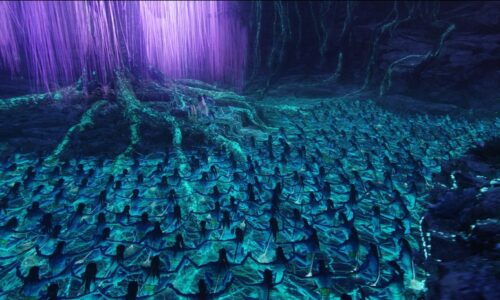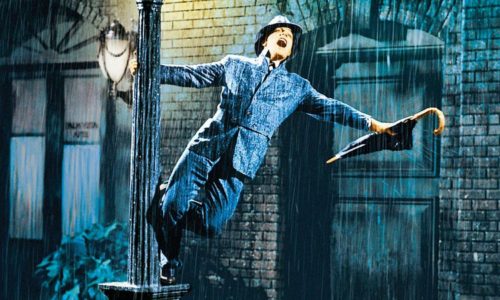
The Universe in A Room: One-Room Science Fiction
- Uncategorized
- September 12, 2024
When I started writing Fermi’s Progress, it was with a clear mission statement. Planet of the week adventures. Just as the star of any Columbo story was a well-regarded character actor playing a pretentious douchebag who believed they had committed the perfect murder, the star of each Fermi story was going to be a new world, whose aliens were as strange as anything you’d find by Dougal Dixon, Wayne Barlow or Alex Ries, but with personalities that were still, somehow, recognisably human, exploring ideas that would then go do even stranger places.
Among many other things, it was my fantasy for a version of Star Trek that could never exist, where every planet was a fully realised world, and every episode had the budget and production values of an Avatar movie (well, maybe The Dark Crystal, for the practical effects).
So, having written Fermi’s Progress, with its Dyson spheres and space elevators and gas giant biomes and (potentially) sentient fungus, how did I decide to launch its sequel, Fermi’s Wake?
I did a bottle episode. With the boundless possibilities of the cosmos and the infinite special effects budget of the imagination, I decided that the Fermi’s triumphant return was going to be set entirely on board the ship, mostly in one room, and propelled entirely by people talking to one another.
There were a lot of reasons for this, but a big one was, aside from my ambitions to write epic tales of weird alien worlds, I have always had a deep love of The One Room Science Fiction Story.
It’d be remiss not to point out this love probably starts with watching low-resolution Youtube streams of The Twilight Zone back in the mid-noughties, and The Twilight Zone really owns the genre from the outside – “Five Characters in Search of an Exit”, “The Midnight Sun”, and “Would the Real Martian Please Stand Up?” are the first three that leap to mind, but the list goes far far longer than that, and frequently manages to pull the trick so smoothly you don’t notice they only have one set.
But I especially love a science fiction movie where the action is confined to one small set, where science fiction ideas have to communicated not through huge set pieces or expensive special effects, but through people talking to one another.
This isn’t a best of list, or even a ranking list. If you like the genre, I reckon everything on this list is worth watching.
Cube
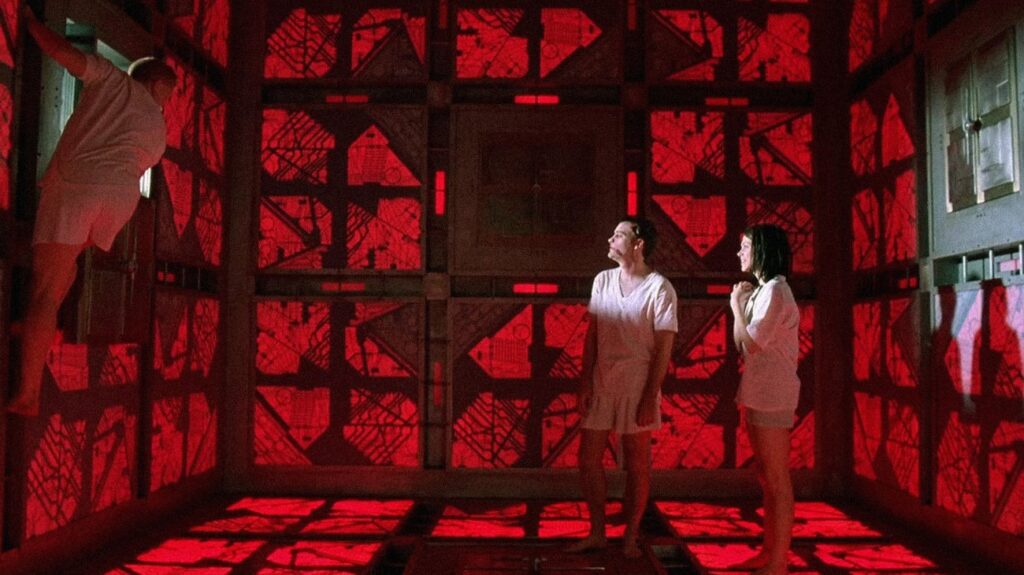
So, I decided to focus on movies rather than Twilight Zone episodes here, but “Five Characters in Search of an Exit” is an episode that made big waves in the genre. A group of mismatched characters find themselves in a windowless, doorless room and have to make their escape. It turns out the “room” is a charity donation bin, and the characters are all dolls.
So that episode’s direct descendants arguably include the Star Trek: The Next Generation episode “Allegiance”, the Pixar movie Toy Story, and the 1997 sci-fi horror Cube.
Now, you could potentially argue that this is a film with many rooms, or at least many identical rooms, but I feel like the spirit of the thing and its lineage allows it entry on this list.
Because while the drama includes plenty of boobytraps and puzzle solving, what drives it is a bunch of strangers bouncing off each other and their surroundings, gradually turning into a metaphor for the unthinking violence of systems.
The Mill

Metaphor you say? The Mill is a film that has heard of writers who use metaphor, and thinks they are all cowards. A Black middle manager wakes up in a room with a millwheel that he is required to turn a given number of rotations a day. If he does not do enough rotations, he is punished. If he does too many rotations, the minimum number of rotations is increased for him and all the other inmates.
His race is not explicitly referred to anywhere in the film, but if you are going to abduct a man and force him to commit hard manual labour, and that man happens to be Black, you are going to be hard pressed to say this was not a deliberate choice.
He spends the film trying to figure out why he is in this room, where he receives instructions from a bland corporate mascot, and advice from a fellow inmate through a grill in the floor. The idea that you must grind away to make a pointless number go up is a metaphor that won’t be going over anyone’s heads. And it is enjoyable on that level.
But throughout the film there are tiny bits of worldbuilding that don’t make sense, and while those bits are easily explained by the films twist, that doesn’t make it satisfying. (As a rule “I saw the twist coming” is a boring criticism, but it’s got to be said this one is hardly surprising).
And maybe it is just that this was made by Fox and I saw it on Disney Plus, but while the satire feels sledgehammer subtle, it also feels strangely toothless. Rather than any real critique of capitalism or corporate business, the message struggles to amount to more than “Jobs? Amiright?”
The Exam
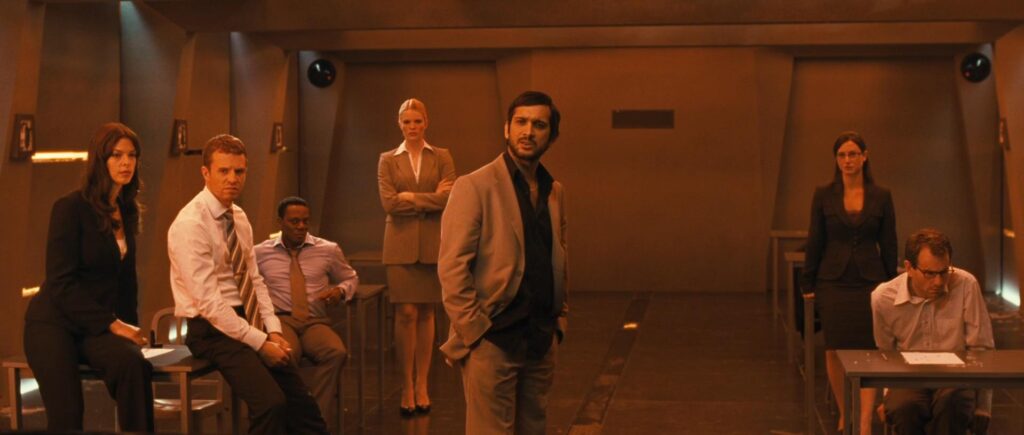
This one is one of my favourites. A bunch of people enter an exam room. They are told that there is one question to answer, and that anyone who leaves the room or spoils their exam paper will be disqualified. The timer starts. The candidates turn over their exam papers, and the papers are blank.
That’s it. That’s the whole film. It’s a great premise, and the film builds on and elaborates upon it without ever breaking that conceit. But what stands out about this film is just how little it makes of the twist ending. The twist at the end isn’t mind blowing. It’s probably not even good. It’s a dad joke of a twist.
But with all these films, and the stories and teleplays that inspired them, a huge amount of emphasis is put on the importance of a twist ending. That’s not what this film is for. This film is people arguing and problem solving together and forming fragile alliances for no longer than they are beneficial. It’s not a logic puzzle, it’s a pressure cooker of character.
Circle

Not the Emma Watson film about social media (that’s The Circle). Its premise, once again, is simple. After an off-screen alien invasion, a bunch of people find themselves standing in spotlights in a circle. It quickly becomes clear they are being executed one by one – and that they all get a vote in who’s next.
That’s it. No twists. No raising of the stakes. No logic puzzles. Just a room full of people killing one another one by one.
And this is what I really like about the one-room sci-fi genre. It allows you to really hone a story right down to the knife edge of the premise, and just run with it.
The Booth at the End
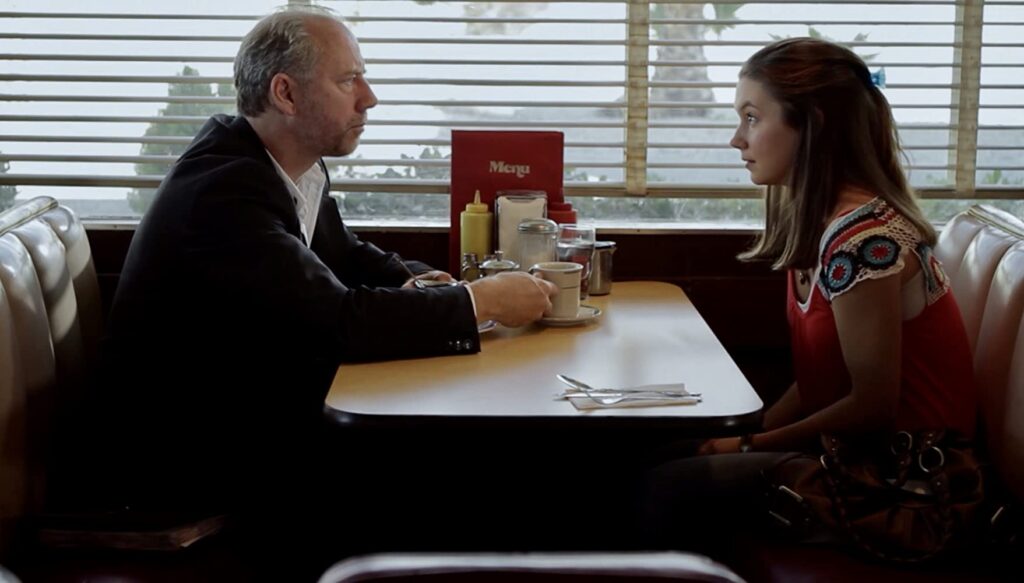
Whether this is a movie, or science fiction, is debatable. The premise places it in a religious fantasy setting not unlike Supernatural or Good Omens rather than science fiction, and the story was originally a web series before being cut into more TV-sized episodes and eventually remade as Italian movie “The Place”.
But I’m including it here because it’s one of the most perfect pieces of storytelling I’ve ever seen, and because it shows how a one room story can have a scope that goes far beyond that.
Once again, the premise is simple. There is a man in a booth at an American diner. If you tell that man what you want, he will give you a task. Complete the task, and you get what want. What you want could be good or bad. The task you are given could be to help someone, or harm them. There’s no correlation between these two things.
What follows is a series of interlinked stories as various people come to ask for things and update him on their progress in fulfilling the task. Xander Berkeley, the mysterious man in the booth, absolutely sells the entire thing. He remains completely impassive, with his affection for some visitors and burning contempt and fear of others always just bubbling beneath the surface.
Seriously, not enough gets said about this film/series. Watch it.
Fermi’s Wake: D & Deception is out now. You can buy it individually or as part of the Fermi’s Wake season pass at Scarlet Ferret, which means I get more royalties and you get a bonus short story, or you can buy it from Amazon here.
Fermi’s Progress is also available as a season pass from Scarlet Ferret (which includes all four Fermi’s Progress novellas in one volume), and can be bought as a paperback from Amazon.
If you want more movie trivia from me, The Ultimate Sci-Fi Movie Quiz Book is also out soon.
